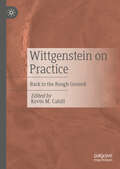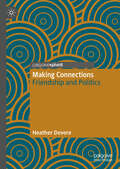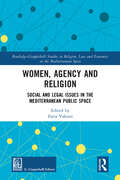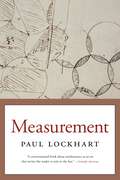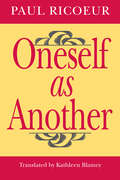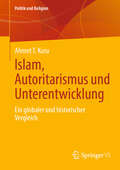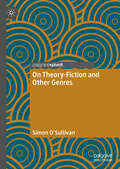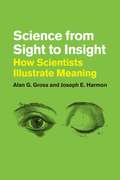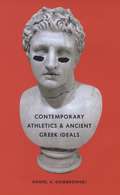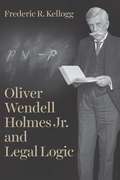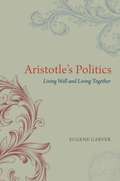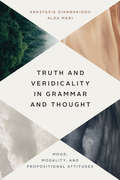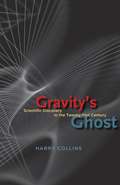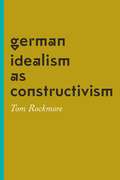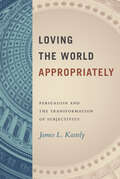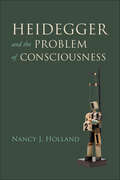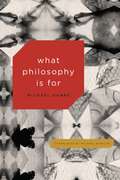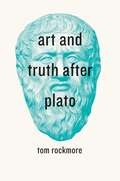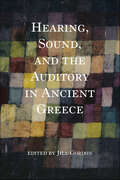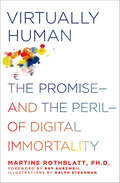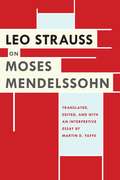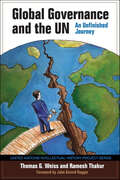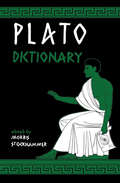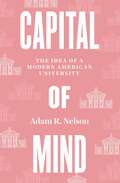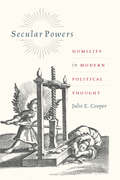- Table View
- List View
Wittgenstein on Practice: Back to the Rough Ground
by Kevin M. CahillThis volume brings together twelve previously unpublished essays on the theme of Wittgenstein on practice and on the insight that careful attention to human or animal activity is essential for thinking about philosophical problems. While Wittgenstein’s thought frames the collection as a whole, each chapter aims first and foremost at rigorous philosophical argument directed at contemporary issues. In this sense, each contribution “drafts” Wittgenstein on practice either by following in his wake, or by critiquing some aspect of his thought, or both. This book is essential reading for all scholars and researchers of Wittgenstein and of philosophical methods.
Making Connections: Friendship and Politics
by Heather DevereThis book is a historical review of literature and ideas that make the connections between friendship and politics. Using pertinent quotations from a wide variety of sources, the book is divided into three main parts. Firstly, it explores interpretations of the concept of friendship, tracing its use from the Ancient Greek and Roman philosophical works, through to modern and postmodern perspectives, touching on different cultural, religious, and ethical connections. Secondly, the concept of the political is identified according to different aspects and ideological emphases, looking at influences in different time periods, and demonstrating the importance of relational politics as viewed through feminism, identity, culture, globalism, and the ethics of care. The third part draws together the political and friendship highlighting the importance of relational politics and civic friendship as a topic relevant for academic consideration of politics.
Women, Agency and Religion: Social and Legal Issues in the Mediterranean Public Space (Routledge-Giappichelli Studies in Religion, Law and Economics in the Mediterranean Space)
by Ilaria ValenziOn both Mediterranean shores, women’s agency is articulated by new social and legal actors that face the religious factor both as an asset and as a brake. This book explores how female agency is defined and takes place in the region. The collection brings together contributions of both theoretical and thematic nature mapping various experiences on the public role of women in the Mediterranean context. In particular, the book relates the two sides, observing affinities and differences in the affirmation of women’s agency. This synoptic approach avoids essentialist contraposition and dialectic between different cultural, religious and political universes and emphasizes the role of a common geopolitical space where women's agency is playing an increasingly decisive role in the building and defense of constitutional democratic political systems. The reflection is enriched by the specific analysis of the role of a “religious factor” in the process of affirmation or, in contrast, as a restraint on women’s agency. The book focuses both on the role of women believers in the processes of transformation of the political contexts of the North African and Euro-Mediterranean area, and on the role of women within religions, questioning from inside the patriarchal traditions of the latter. The book applies a multidisciplinary approach to the theme of women’s agency, in which law, sociology, theology and philosophy interact with each other. As such, it will be a valuable resource for those working in the areas of Human Rights Law, Law and Religion, Socio-legal Studies and Gender Studies.
Measurement
by Paul LockhartPaul Lockhart’s Mathematician’s Lament outlined how we introduce math to students in the wrong way. Measurement explains how math should be done. With plain English and pictures, Lockhart makes complex ideas about shape and motion intuitive and graspable, and offers a solution to math phobia by introducing us to math as an artful way of thinking and living.In conversational prose that conveys his passion for the subject, Lockhart makes mathematics accessible without oversimplifying. He makes no more attempt to hide the challenge of mathematics than he does to shield us from its beautiful intensity. Favoring plain English and pictures over jargon and formulas, he succeeds in making complex ideas about the mathematics of shape and motion intuitive and graspable. His elegant discussion of mathematical reasoning and themes in classical geometry offers proof of his conviction that mathematics illuminates art as much as science.Lockhart leads us into a universe where beautiful designs and patterns float through our minds and do surprising, miraculous things. As we turn our thoughts to symmetry, circles, cylinders, and cones, we begin to see that almost anyone can “do the math” in a way that brings emotional and aesthetic rewards. Measurement is an invitation to summon curiosity, courage, and creativity in order to experience firsthand the playful excitement of mathematical work.
Oneself as Another
by Paul RicoeurPaul Ricoeur has been hailed as one of the most important thinkers of the century. Oneself as Another, the clearest account of his "philosophical ethics," substantiates this position and lays the groundwork for a metaphysics of morals. Focusing on the concept of personal identity, Ricoeur develops a hermeneutics of the self that charts its epistemological path and ontological status.
Islam, Autoritarismus und Unterentwicklung: Ein globaler und historischer Vergleich (Politik und Religion)
by Ahmet T. KuruWarum weisen Länder mit muslimischer Bevölkerungsmehrheit im Vergleich zum Weltdurchschnitt ein niedriges Maß an Demokratie und sozioökonomischer Entwicklung auf? Dieses Buch kritisiert Erklärungen, die den Islam als Ursache dieser Ungleichheit anführen, da die Muslime zwischen dem 9. und 12. Jahrhundert philosophisch und sozioökonomisch weiter fortgeschritten waren als die Westeuropäer. Auch der westliche Kolonialismus war nicht die Ursache: Die Muslime litten bereits unter politischen und sozioökonomischen Problemen, als die Kolonisierung begann. Dieses Buch argumentiert, dass die Muslime in ihrer frühen Geschichte, als in Europa religiöse Orthodoxie und Militärherrschaft vorherrschten, einflussreiche Denker und Kaufleute hatten. Im 11. Jahrhundert entstand jedoch ein Bündnis zwischen orthodoxen islamischen Gelehrten (den Ulema) und Militärstaaten. Dieses Bündnis erstickte allmählich die intellektuelle und wirtschaftliche Kreativität, indem es die intellektuellen und bürgerlichen Klassen in der muslimischen Welt marginalisierte. Dieses Bündnis behindert auch heute noch Kreativität und Wettbewerb in muslimischen Ländern. Die Rohfassung der deutschen Übersetzung hat ein maschinelles Übersetzungsprogramm mit Hilfe künstlicher Intelligenz angefertigt. Eine anschließende menschliche Überarbeitung erfolgte vor allem in inhaltlicher Hinsicht, so dass sich das Buch stilistisch anders lesen wird als eine herkömmliche Übersetzung.
On Theory-Fiction and Other Genres
by Simon O'SullivanThis book looks at three different kinds of writing practice - theory-fiction, autofiction/autotheory and art writing - that are increasingly prevalent as genres (or ‘hybrid genres’) in the arts and critical humanities. The chapters in the book operate as a critical survey of these new forms of writing (many examples are listed) whilst at the same time they each work towards some provisional definitions. Some key precursors to these new genres are also identified. The book explores what these new kinds of writing do. What is particular to them or what do they add to those already existing styles and genres (and especially the academic essay and article)? Key here is that each form of writing works in a performative manner or as a device that enables a shift in perspective. A case is made for their urgency in relation to contemporary issues and concerns and for their importance in terms of being both from and for more marginalised communities. The book concludes with a discussion of machine writing and especially our collaboration with artificial intelligence language models.
Science from Sight to Insight: How Scientists Illustrate Meaning
by Alan G. Gross Joseph E. HarmonJohn Dalton’s molecular structures. Scatter plots and geometric diagrams. Watson and Crick’s double helix. The way in which scientists understand the world—and the key concepts that explain it—is undeniably bound up in not only words, but images. Moreover, from PowerPoint presentations to articles in academic journals, scientific communication routinely relies on the relationship between words and pictures. In Science from Sight to Insight, Alan G. Gross and Joseph E. Harmon present a short history of the scientific visual, and then formulate a theory about the interaction between the visual and textual. With great insight and admirable rigor, the authors argue that scientific meaning itself comes from the complex interplay between the verbal and the visual in the form of graphs, diagrams, maps, drawings, and photographs. The authors use a variety of tools to probe the nature of scientific images, from Heidegger’s philosophy of science to Peirce’s semiotics of visual communication. Their synthesis of these elements offers readers an examination of scientific visuals at a much deeper and more meaningful level than ever before.
Contemporary Athletics & Ancient Greek Ideals
by Daniel A. DombrowskiDespite their influence in our culture, sports inspire dramatically less philosophical consideration than such ostensibly weightier topics as religion, politics, or science. Arguing that athletic playfulness coexists with serious underpinnings, and that both demand more substantive attention, Daniel Dombrowski harnesses the insights of ancient Greek thinkers to illuminate contemporary athletics. Dombrowski contends that the ideas of Plato, Aristotle, and Plotinus shed important light on issues—such as the pursuit of excellence, the concept of play, and the power of accepting physical limitations while also improving one’s body—that remain just as relevant in our sports-obsessed age as they were in ancient Greece. Bringing these concepts to bear on contemporary concerns, Dombrowski considers such questions as whether athletic competition can be a moral substitute for war, whether it necessarily constitutes war by other means, and whether it encourages fascist tendencies or ethical virtue. The first volume to philosophically explore twenty-first-century sport in the context of its ancient predecessor, Contemporary Athletics and Ancient Greek Ideals reveals that their relationship has great and previously untapped potential to inform our understanding of human nature.
Oliver Wendell Holmes Jr. and Legal Logic
by Frederic R. KelloggWith Oliver Wendell Holmes, Jr. and Legal Logic, Frederic R. Kellogg examines the early diaries, reading, and writings of Justice Oliver Wendell Holmes, Jr. (1841–1935) to assess his contribution to both legal logic and general logical theory. Through discussions with his mentor Chauncey Wright and others, Holmes derived his theory from Francis Bacon’s empiricism, influenced by recent English debates over logic and scientific method, and Holmes’s critical response to John Stuart Mill’s 1843 A System of Logic. Conventional legal logic tends to focus on the role of judges in deciding cases. Holmes recognized input from outside the law—the importance of the social dimension of legal and logical induction: how opposing views of “many minds” may converge. Drawing on analogies from the natural sciences, Holmes came to understand law as an extended process of inquiry into recurring problems. Rather than vagueness or contradiction in the meaning or application of rules, Holmes focused on the relation of novel or unanticipated facts to an underlying and emergent social problem. Where the meaning and extension of legal terms are disputed by opposing views and practices, it is not strictly a legal uncertainty, and it is a mistake to expect that judges alone can immediately resolve the larger issue.
Aristotle's Politics: Living Well and Living Together
by Eugene Garver“Man is a political animal,” Aristotle asserts near the beginning of the Politics. In this novel reading of one of the foundational texts of political philosophy, Eugene Garver traces the surprising implications of Aristotle’s claim and explores the treatise’s relevance to ongoing political concerns. Often dismissed as overly grounded in Aristotle’s specific moment in time, in fact the Politics challenges contemporary understandings of human action and allows us to better see ourselves today. Close examination of Aristotle’s treatise, Garver finds, reveals a significant, practical role for philosophy to play in politics. Philosophers present arguments about issues—such as the right and the good, justice and modes of governance, the relation between the good person and the good citizen, and the character of a good life—that politicians must then make appealing to their fellow citizens. Completing Garver’s trilogy on Aristotle’s unique vision, Aristotle’s Politics yields new ways of thinking about ethics and politics, ancient and modern.
Truth and Veridicality in Grammar and Thought: Mood, Modality, and Propositional Attitudes
by Anastasia Giannakidou Alda Mari PhDCan language directly access what is true, or is the truth judgment affected by the subjective, perhaps even solipsistic, constructs of reality built by the speakers of that language? The construction of such subjective representations is known as veridicality, and in this book Anastasia Giannakidou and Alda Mari deftly address the interaction between truth and veridicality in the grammatical phenomena of mood choice: the indicative and subjunctive choice in the complements of modal expressions and propositional attitude verbs.Combining several strands of analysis—formal linguistic semantics, syntactic theory, modal logic, and philosophy of language—Giannakidou and Mari’s theory not only enriches the analysis of linguistic modality, but also offers a unified perspective of modals and propositional attitudes. Their synthesis covers mood, modality, and attitude verbs in Greek and Romance languages, while also offering broader applications for languages lacking systematic mood distinction, such as English. Truth and Veridicality in Grammar and Thought promises to shape longstanding conversations in formal semantics, pragmatics, and philosophy of language, among other areas of linguistics.
Gravity's Ghost: Scientific Discovery in the Twenty-first Century
by Harry CollinsA gripping look at gravitational wave research and what it says about scientific discovery and the future of the scientific community.&“This fine book pairs exploratory analysis with the pulse of a detective story. Giving a portrait of the way a community chose to test itself on the threshold of new knowledge, Collins offers the rich sociological insight that can only be won from uncommon experience, from a long-standing dialogue with the community he studies, and from a moral engagement in the future of science.&” —Richard Staley, author of Einstein&’s Generation: The Origins of the Relativity Revolution In theory, at least, gravitational waves do exist. We are constantly bathed in gravitational radiation, which is generated when stars explode or collide and a portion of their mass becomes energy that ripples out like a disturbance on the surface of a serene pond. But unfortunately no gravitational wave has ever been directly detected even though the search has lasted more than forty years. As the leading chronicler of the search for gravitational waves, Harry Collins has been right there with the scientists since the start. The result of his unprecedented access to the front lines of physical science is Gravity&’s Ghost, a thrilling chronicle of high-stakes research and cutting-edge discovery. Here, Collins reveals that scientific discovery and nondiscovery can turn on scientific traditions and rivalries, that ideal statistical analysis rests on impossible procedures and unattainable knowledge, and that fact in one place is baseless assumption in another. He also argues that sciences like gravitational wave detection, in exemplifying how the intractable is to be handled, can offer scientific leadership a moral beacon for the twenty-first century. In the end, Gravity&’s Ghost shows that discoveries are the denouements of dramatic scientific mysteries. &“A sociologist embedded (with full access!) in the LIGO Scientific Collaboration chronicles the search for gravitational waves. Though physicists, with very few exceptions, are in no doubt that gravitational waves exist, evidence for their passage through the new kilometer-length interferometers would nevertheless represent the scientific event of the twenty-first century. Harry Collins has turned the initial joined search exploiting the LIGO and Virgo instruments into a detective novel that exquisitely describes the social processes associated with discovery (and statistical analysis) in a large collaborative effort.&”—Francis Halzen, University of Wisconsin–Madison and Director of Icecube Neutrino Detector Project
German Idealism as Constructivism
by Tom RockmoreGerman Idealism as Constructivism is the culmination of many years of research by distinguished philosopher Tom Rockmore—it is his definitive statement on the debate about German idealism between proponents of representationalism and those of constructivism that still plagues our grasp of the history of German idealism and the whole epistemological project today. Rockmore argues that German idealism—which includes iconic thinkers such as Kant, Fichte, Schelling, and Hegel—can best be understood as a constructivist project, one that asserts that we cannot know the mind-independent world as it is but only our own mental construction of it. Since ancient Greece philosophers have tried to know the world in itself, an effort that Kant believed had failed. His alternative strategy—which came to be known as the Copernican revolution—was that the world as we experience and know it depends on the mind. Rockmore shows that this project was central to Kant’s critical philosophy and the later German idealists who would follow him. He traces the different ways philosophers like Fichte, Schelling, and Hegel formulated their own versions of constructivism. Offering a sweeping but deeply attuned analysis of a crucial part of the legacy of German idealism, Rockmore reinvigorates this school of philosophy and opens up promising new avenues for its study.
Loving the World Appropriately: Persuasion and the Transformation of Subjectivity
by James L. KastleyA revolutionary approach to rhetoric that asks why audiences need persuading. What is persuasion? For some, it is the ideal alternative to violence. For others, persuasion is simply a neutral instrumentality—a valued source of soft power. Both positions rest on a fundamental belief: persuasion is a power that resides in a speaker acting on an audience. Loving the World Appropriately asks a different, more fundamental, question: why does an audience need persuasion? In shifting our focus, James Kastely delivers a provocative new history of rhetoric and philosophy, one that describes rhetoric as more than a matter of effective communication and recasts persuasion as a philosophical concern central to notions of human subjectivity. Ultimately, Kastely insists, persuasion enables us to love the world appropriately.
Heidegger and the Problem of Consciousness
by Nancy J. HollandNancy J. Holland turns to the thought of Martin Heidegger to help understand an age-old philosophical question: Is there a split between the body and the mind? Arguing against philosophical positions that define human consciousness as an overarching phenomenon or reduce it to the brain or physicality, Holland contends that consciousness is relational and it is this relationship that allows us to inhabit and negotiate in the world. Holland forwards a complex and nuanced reading of Heidegger as she focuses on consciousness, being, and what might constitute the animal or, more broadly, other-than-human world. Holland engages with the depth and breadth of Heidegger's work as she opens space for a discussion about the uniqueness of human consciousness.
What Philosophy Is For
by Michael HampeWhat is the state of philosophy today, and what might it be tomorrow? With What Philosophy Is For, Michael Hampe answers these questions by exploring the relationships among philosophy, education, science, and narrative, developing a Socratic critique of philosophical doctrines. Philosophers generally develop systematic theories that lay out the basic structures of human experience, in order to teach the rest of humanity how to rightly understand our place in the world. This “scientific” approach to philosophy, Hampe argues, is too one-sided. In this magnum opus of an essay, Hampe aims to rescue philosophy from its current narrow claims of doctrine and to remind us what it is really for—to productively disillusion us into clearer thinking. Hampe takes us through twenty-five hundred years of intellectual history, starting with Socrates. That archetype of the philosophical teacher did not develop strict doctrines and rules, but rather criticized and refuted doctrines. With the Socratic method, we see the power of narration at work. Narrative and analytical disillusionment, Hampe argues, are the most helpful long-term enterprises of thought, the ones most worth preserving and developing again.What Philosophy Is For is simultaneously an introduction, a critique, and a call to action. Hampe shows how and why philosophy became what it is today, and, crucially, shows what it could be once more, if it would only turn its back on its pretensions to dogma: a privileged space for reflecting on the human condition.
Art and Truth after Plato
by Tom RockmoreDespite its foundational role in the history of philosophy, Plato’s famous argument that art does not have access to truth or knowledge is now rarely examined, in part because recent philosophers have assumed that Plato’s challenge was resolved long ago. In Art and Truth after Plato, Tom Rockmore argues that Plato has in fact never been satisfactorily answered—and to demonstrate that, he offers a comprehensive account of Plato’s influence through nearly the whole history of Western aesthetics. Rockmore offers a cogent reading of the post-Platonic aesthetic tradition as a series of responses to Plato’s position, examining a stunning diversity of thinkers and ideas. He visits Aristotle’s Poetics, the medieval Christians, Kant’s Critique of Judgment, Hegel’s phenomenology, Marxism, social realism, Heidegger, and many other works and thinkers, ending with a powerful synthesis that lands on four central aesthetic arguments that philosophers have debated. More than a mere history of aesthetics, Art and Truth after Plato presents a fresh look at an ancient question, bringing it into contemporary relief.
Hearing, Sound, and the Auditory in Ancient Greece (Studies in Continental Thought)
by Jill GordonHearing, Sound, and the Auditory in Ancient Greece represents the first wide-ranging philosophical study of the role of sound and hearing in the ancient Greek world. Because our modern western culture is a particularly visual one, we can overlook the significance of the auditory which was so central to the Greeks. The fifteen chapters of this edited volume explore "hearing" as being philosophically significant across numerous texts and figures in ancient Greek philosophy. Through close analysis of the philosophy of such figures as Homer, Heraclitus, Pythagoreans, Sophocles, Empedocles, Socrates, Plato, Aristotle, Hearing, Sound, and Auditory in Ancient Greece presents new and unique research from philosophers and classicists that aims to redirect us to the ways in which sound, hearing, listening, voice, and even silence shaped and reflected the worldview of ancient Greece.
Virtually Human: The Promise—and the Peril—of Digital Immortality
by Martine RothblattVirtually Human explores what the not-too-distant future will look like when cyberconsciousness—simulation of the human brain via software and computer technology—allows our consciousness to be present forever.Meet Bina48, the world's most sentient robot, commissioned by Martine Rothblatt and created by Hanson Robotics. Bina48 is a nascent Mindclone of Martine's wife that can engage in conversation, answer questions, and even have spontaneous thoughts that are derived from multimedia data in a Mindfile created by the real Bina. If you're active on Twitter or Facebook, share photos through Instagram, or blogging regularly, you're already on your way to creating a Mindfile—a digital database of your thoughts, memories, feelings, and opinions that is essentially a back-up copy of your mind. Soon, this Mindfile can be made conscious with special software—Mindware—that mimics the way human brains organize information, create emotions and achieve self-awareness. This may sound like science-fiction A.I. (artificial intelligence), but the nascent technology already exists. Thousands of software engineers across the globe are working to create cyberconsciousness based on human consciousness and the Obama administration recently announced plans to invest in a decade-long Brain Activity Map project. Virtually Human is the only book to examine the ethical issues relating to cyberconsciousness and Rothblatt, with a Ph.D. in medical ethics, is uniquely qualified to lead the dialogue.
Leo Strauss on Moses Mendelssohn
by Leo StraussMoses Mendelssohn (1729–86) was the leading Jewish thinker of the German Enlightenment and the founder of modern Jewish philosophy. His writings, especially his attempt during the Pantheism Controversy to defend the philosophical legacies of Spinoza and Leibniz against F. H. Jacobi’s philosophy of faith, captured the attention of a young Leo Strauss and played a critical role in the development of his thought on one of the fundamental themes of his life’s work: the conflicting demands of reason and revelation. Leo Strauss on Moses Mendelssohn is a superbly annotated translation of ten introductions written by Strauss to a multi-volume critical edition of Mendelssohn’s work. Commissioned in Weimar Germany in the 1920s, the project was suppressed and nearly destroyed during Nazi rule and was not revived until the 1960s. In addition to Strauss’s introductions, Martin D. Yaffe has translated Strauss’s editorial remarks on each of the passages he annotates in Mendelssohn’s texts and brings those together with the introductions themselves. Yaffe has also contributed an extensive interpretive essay that both analyzes the introductions on their own terms and discusses what Strauss writes elsewhere about the broader themes broached in his Mendelssohn studies. Strauss’s critique of Mendelssohn represents one of the largest bodies of work by the young Strauss on a single thinker to be made available in English. It illuminates not only a formerly obscure phase in the emergence of his thought but also a critical moment in the history of the German Enlightenment.
Global Governance and the UN: An Unfinished Journey (United Nations Intellectual History Project Series)
by Thomas G. Weiss Ramesh ThakurIn the 21st century, the world is faced with threats of global scale that cannot be confronted without collective action. Although global government as such does not exist, formal and informal institutions, practices, and initiatives—together forming "global governance"—bring a greater measure of predictability, stability, and order to trans-border issues than might be expected. Yet, there are significant gaps between many current global problems and available solutions. Thomas G. Weiss and Ramesh Thakur analyze the UN's role in addressing such knowledge, normative, policy, institutional, and compliance lapses. The UN's relationship to these five global governance gaps is explored through case studies of some of the most burning problems of our age, including terrorism, nuclear proliferation, humanitarian crises, development aid, climate change, human rights, and HIV/AIDS.
Plato Dictionary
by Morris StockhammerThe companion volume to the well-known Aristotle Dictionary—a comprehensive and alphabetically organized glossary of the basic writings of Plato. For many years, Morris Stockhammer scanned through the dialogues of Plato in an effort to find and collect those pithy thoughts that represent the essence of Platonism. The perfect dictionary for philosophers and students of ancient philosophy, the Plato Dictionary includes explanations, definitions, and explications of Plato&’s vocabulary often using his own words to complete the description. Each entry also includes a citation from Plato&’s indispensable oeuvre. Morris Stockhammer was a lexicographer and historian known for his subject dictionaries on famous philosophers including Immanuel Kant, Plato, Karl Marx, and Thomas Aquinas. He also published on European economics and history.
Capital of Mind: The Idea of a Modern American University
by Adam R. NelsonThe second volume of an ambitious new economic history of American higher education.Capital of Mind is the second volume in a breathtakingly ambitious new economic history of American higher education. Picking up from the first volume, Exchange of Ideas, Adam R. Nelson looks at the early decades of the nineteenth century, explaining how the idea of the modern university arose from a set of institutional and ideological reforms designed to foster the mass production and mass consumption of knowledge. This “industrialization of ideas” mirrored the industrialization of the American economy and catered to the demands of a new industrial middle class for practical and professional education. From Harvard in the north to the University of Virginia in the south, new experiments with the idea of a university elicited intense debate about the role of scholarship in national development and international competition, and whether higher education should be supported by public funds, especially in periods of fiscal austerity. The history of capitalism and the history of the university, Nelson reveals, are intimately intertwined—which raises a host of important questions that remain salient today. How do we understand knowledge and education as commercial goods? Should they be public or private? Who should pay for them? And, fundamentally, what is the optimal system of higher education for a capitalist democracy?
Secular Powers: Humility in Modern Political Thought
by Julie E. CooperSecularism is usually thought to contain the project of self-deification, in which humans attack God’s authority in order to take his place, freed from all constraints. Julie E. Cooper overturns this conception through an incisive analysis of the early modern justifications for secular politics. While she agrees that secularism is a means of empowerment, she argues that we have misunderstood the sources of secular empowerment and the kinds of strength to which it aspires. Contemporary understandings of secularism, Cooper contends, have been shaped by a limited understanding of it as a shift from vulnerability to power. But the works of the foundational thinkers of secularism tell a different story. Analyzing the writings of Hobbes, Spinoza, and Rousseau at the moment of secularity’s inception, she shows that all three understood that acknowledging one’s limitations was a condition of successful self-rule. And while all three invited humans to collectively build and sustain a political world, their invitations did not amount to self-deification. Cooper establishes that secular politics as originally conceived does not require a choice between power and vulnerability. Rather, it challenges us—today as then—to reconcile them both as essential components of our humanity.
